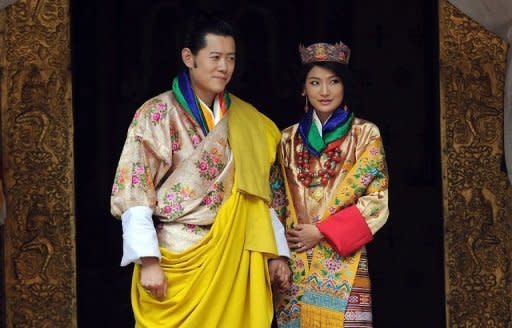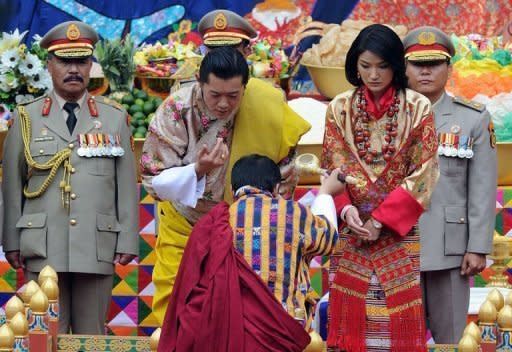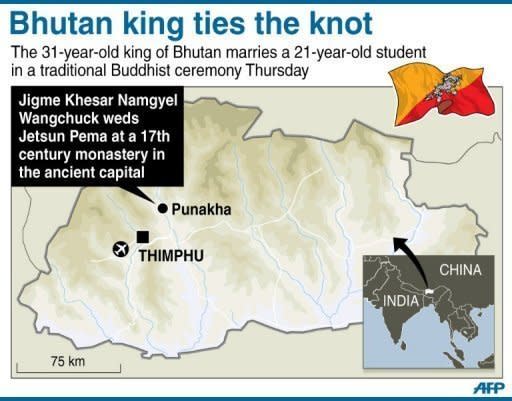Bhutan's Dragon King crowns his bride
Bhutan's 31-year-old king married a student 10 years his junior on Thursday in a colourful ceremony showcasing the rich Buddhist culture of one of the world's most remote and insular countries. Amid clouds of incense and chanting monks, the hugely popular King Jigme Khesar Namgyel Wangchuck crowned his queen at the end of a series of rituals in the 17th-century fortified monastery chosen for the occasion. After a brief purification ceremony to start, they walked hand-in-hand and smiling to the inner sanctum of the monastery where an hour of blessings, prostrations and prayers culminated in the queen taking the throne. The "Dragon King", an Oxford graduate who came to power in 2008 at the start of democracy in Bhutan, married Jetsun Pema, the daughter of an airline pilot widely admired for her beauty and her impact on the love-struck monarch. The king, the fifth in a line of hereditary rulers who have reigned for the last 100 years, was in a relaxed mood when he spoke to a small group of reporters during one of his trademark walk-arounds after lunch. "I am happy. I have been waiting for quite some time. It doesn't matter when you get married as long as it is the right person," he said. "I am certain I have married the right person," he added. The royal couple apparently first met aged 17 and seven at a family picnic in Thimphu. Pema, though described in Bhutan as a commoner, has links to the first family through her parents. The new queen, who often looked nervous as the heavily symbolic ceremony unfolded, wore an elaborately weaved outfit of gold, red and black. She smiled anxiously as she received the crown. Her husband initially struggled to secure the embroidered headpiece which slipped off her hair several times before finally staying put. "She carried her responsibilities superbly well. I was very proud of her," the king said. "She is a wonderful human being. Intelligent. She and I share one big thing in common: a love and passion for art." The ceremony at the monastery, set at the confluence of two rivers and surrounded by mist-shrouded hills, was beamed live across the country of 700,000 people and signalled the start of three days of joyful celebrations. Bhutan banned foreign television until 1999 and is the only nation in the world whose government pursues "Gross National Happiness" for its people instead of economic growth. "You can be sure that our happiness is increasing," joked Karma Tshiteem, the head of the Gross National Happiness Commission, which vets government policy. Prime Minister Jigmi Thinley told AFP the wedding was of "great significance politically" as well as a source of national pride and excitement. "It ensures the continuity of the monarchy. Until the king gets married people are always concerned," Thinley said. "The king's importance in democracy hasn't diminished. He will always be seen as the ultimate anchor." Security was tight around the monastery, with phone networks jammed and police enforcing strict controls on vehicles, but the royal couple later mingled openly with local villagers who turned out in their thousands. "The king has finally got a companion who is from a noble family, and she has very good qualities," Bago Dem, a local resident in her 60s, told AFP. "They understand the problems of the people." The king, who is known to invite his subjects round for tea, had requested a simple and traditional ceremony. No foreign VIPs or fellow royals were among the assembled dignitaries and friends of the couple. Yiwang Pindarica, one of the king's cousins, who studied with Pema, said the new queen was "very sweet and caring and she loves children". "I'm sure she will help the king fulfil his duties," she said. The Bhutanese royal family are credited with bringing stability to the formerly war-wracked nation and ensuring its independence despite giant neighbours India and China to the north and south. Bhutan, which has never been colonised, remained in self-imposed isolation for centuries and is still wary of outside influence and the impact of globalisation. The country had no roads or currency until the 1960s and continues to resist mass tourism to this day.





